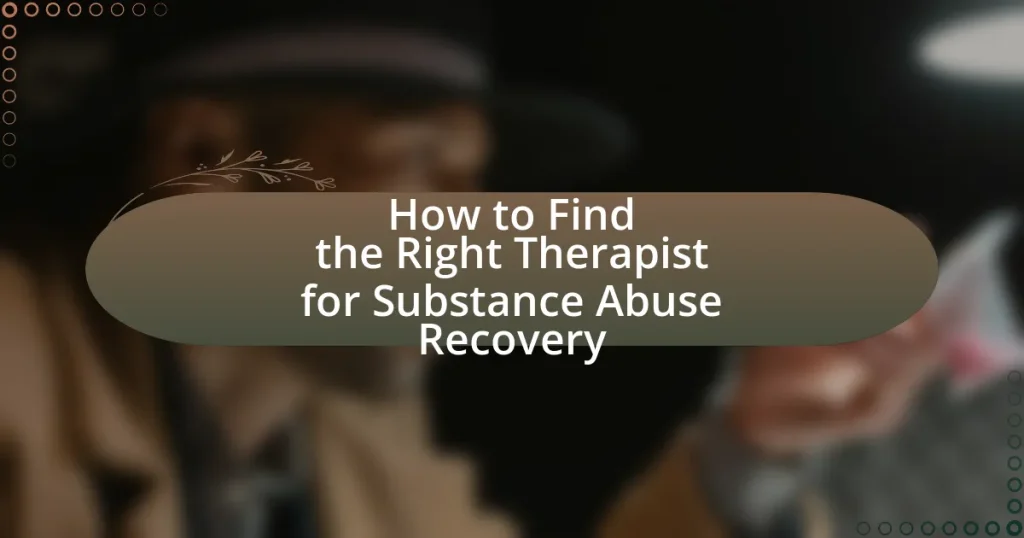The article focuses on the process of finding the right therapist for substance abuse recovery, emphasizing the importance of identifying individual needs, verifying therapist credentials, and assessing compatibility through initial consultations. It outlines various types of therapists available, including licensed clinical social workers, psychologists, and addiction counselors, and discusses the significance of their qualifications and experience in influencing treatment outcomes. Additionally, the article provides practical steps for evaluating potential therapists, utilizing online resources, and preparing for therapy sessions, ensuring that individuals can make informed decisions in their recovery journey.

What is the process of finding the right therapist for substance abuse recovery?
The process of finding the right therapist for substance abuse recovery involves several key steps. First, individuals should identify their specific needs, such as the type of substance abuse, preferred therapy methods, and any co-occurring mental health issues. Next, they can seek recommendations from healthcare providers, support groups, or trusted individuals who have experience with substance abuse treatment.
After gathering potential therapists, individuals should verify their credentials, ensuring they are licensed and have experience in substance abuse recovery. It is also important to assess compatibility through initial consultations, where individuals can discuss their concerns and gauge the therapist’s approach.
Research indicates that a strong therapeutic alliance significantly enhances treatment outcomes, making it crucial to find a therapist with whom one feels comfortable and understood. According to a study published in the Journal of Substance Abuse Treatment, effective communication and trust between the therapist and client are vital for successful recovery.
How can you identify your specific needs in therapy?
To identify your specific needs in therapy, begin by reflecting on your personal experiences and challenges related to substance abuse. This self-assessment can include recognizing triggers, understanding emotional responses, and identifying patterns of behavior that contribute to substance use. Research indicates that individuals who engage in self-reflection and journaling about their experiences are better equipped to articulate their needs in therapy, leading to more effective treatment outcomes. By clearly defining these aspects, you can communicate your needs to a therapist, ensuring that the therapeutic approach aligns with your recovery goals.
What factors should you consider when assessing your needs?
When assessing your needs for substance abuse recovery, consider the type of therapy required, the therapist’s qualifications, and your personal preferences. The type of therapy includes options like cognitive-behavioral therapy, group therapy, or holistic approaches, which can significantly impact recovery outcomes. The therapist’s qualifications, such as licensure, experience with substance abuse, and specialized training, are crucial for effective treatment. Personal preferences, including gender, cultural competence, and therapeutic style, also play a vital role in establishing a comfortable and trusting therapeutic relationship. Research indicates that a good match between the therapist’s approach and the client’s needs enhances engagement and success in recovery.
How do personal experiences influence your therapy requirements?
Personal experiences significantly influence therapy requirements by shaping individual needs, preferences, and responses to treatment. For instance, someone with a history of trauma may require trauma-informed care, while an individual with a family history of substance abuse might benefit from family therapy approaches. Research indicates that personalized therapy, which considers these experiences, leads to better outcomes; a study published in the Journal of Substance Abuse Treatment found that tailored interventions improve engagement and retention in treatment programs. Thus, understanding personal experiences is crucial for selecting the most effective therapeutic approach for substance abuse recovery.
What types of therapists are available for substance abuse recovery?
Various types of therapists are available for substance abuse recovery, including licensed clinical social workers, psychologists, psychiatrists, and addiction counselors. Licensed clinical social workers provide therapy and support, focusing on the social and emotional aspects of recovery. Psychologists offer evidence-based therapies, such as cognitive-behavioral therapy, to address underlying issues related to substance use. Psychiatrists can prescribe medication and manage co-occurring mental health disorders. Addiction counselors specialize in substance use disorders and often have specific training in recovery techniques. Each type of therapist plays a crucial role in a comprehensive treatment plan tailored to individual needs.
What are the differences between psychologists, counselors, and social workers?
Psychologists, counselors, and social workers differ primarily in their education, training, and scope of practice. Psychologists typically hold a doctoral degree in psychology and are trained to conduct psychological testing, diagnose mental health disorders, and provide therapy. Counselors usually have a master’s degree in counseling or a related field and focus on providing guidance and support for specific issues, often through talk therapy. Social workers, who also generally hold a master’s degree in social work, are trained to address social issues and provide support services, often linking clients to community resources while also offering therapy. These distinctions are crucial for individuals seeking the right professional for substance abuse recovery, as each role brings unique skills and approaches to treatment.
How do specialized therapists differ from general practitioners in substance abuse treatment?
Specialized therapists differ from general practitioners in substance abuse treatment primarily in their focused expertise and tailored therapeutic approaches. Specialized therapists, such as addiction counselors or licensed clinical social workers, possess advanced training and certifications specifically in substance use disorders, enabling them to apply evidence-based practices and interventions that are effective for addiction recovery. In contrast, general practitioners have a broader medical training but may lack the specific knowledge and skills required to address the complexities of substance abuse. Research indicates that patients receiving treatment from specialized therapists report higher satisfaction and better outcomes, as these professionals are adept at understanding the psychological, social, and behavioral aspects of addiction, which are crucial for effective recovery.
Why is it important to consider credentials and experience?
Considering credentials and experience is crucial when selecting a therapist for substance abuse recovery because these factors directly influence the quality of care provided. Credentials, such as licenses and certifications, ensure that the therapist has met specific educational and professional standards, which is essential for effective treatment. Experience, particularly in substance abuse, indicates that the therapist has practical knowledge and skills to handle various cases and challenges that may arise during recovery. Research shows that therapists with specialized training and extensive experience are more likely to employ evidence-based practices, leading to better patient outcomes. For instance, a study published in the Journal of Substance Abuse Treatment found that clients treated by experienced therapists reported higher satisfaction and improved recovery rates.
What qualifications should you look for in a substance abuse therapist?
A substance abuse therapist should possess relevant qualifications such as a master’s degree in psychology, social work, or counseling, along with specific certifications in substance abuse treatment. These qualifications ensure that the therapist has the necessary education and training to effectively address addiction issues. For instance, certifications from recognized organizations like the National Association of Alcoholism and Drug Abuse Counselors (NAADAC) or the International Certification & Reciprocity Consortium (IC&RC) validate a therapist’s expertise in the field. Additionally, licensure as a Licensed Professional Counselor (LPC) or Licensed Clinical Social Worker (LCSW) is crucial, as it indicates adherence to professional standards and ethical guidelines in therapy.
How does a therapist’s experience impact treatment outcomes?
A therapist’s experience significantly impacts treatment outcomes by enhancing their ability to effectively address clients’ needs and challenges. Experienced therapists are often better equipped to utilize evidence-based practices, adapt therapeutic techniques to individual circumstances, and build strong therapeutic alliances, all of which contribute to improved client engagement and success rates. Research indicates that clients working with therapists who have more years of experience report higher satisfaction and better outcomes, as evidenced by a study published in the Journal of Counseling Psychology, which found that therapist experience correlates positively with client improvement metrics.

How do you evaluate potential therapists for substance abuse recovery?
To evaluate potential therapists for substance abuse recovery, assess their qualifications, experience, and treatment approaches. Verify that the therapist holds relevant credentials, such as a license in mental health or addiction counseling, which indicates they have met professional standards. Additionally, consider their experience specifically in substance abuse recovery, as therapists with a background in this area are more likely to understand the complexities involved.
Inquire about their treatment methods, such as cognitive-behavioral therapy or motivational interviewing, to ensure they align with your needs. Research shows that evidence-based practices significantly improve recovery outcomes, making it crucial to select a therapist who employs these techniques. Furthermore, evaluate their compatibility with you through initial consultations, where you can gauge their communication style and empathy, both of which are essential for effective therapy.
What questions should you ask during the initial consultation?
During the initial consultation for substance abuse recovery, you should ask questions that clarify the therapist’s qualifications, treatment approach, and experience. Specifically, inquire about their credentials, such as whether they are licensed and have specialized training in substance abuse treatment. Additionally, ask about their therapeutic methods, including whether they use evidence-based practices like Cognitive Behavioral Therapy or Motivational Interviewing. It is also important to understand their experience with cases similar to yours, so ask how many clients they have treated with your specific substance use issues. Furthermore, inquire about the expected duration of treatment and how progress will be measured. These questions ensure that you select a therapist who is well-equipped to support your recovery journey.
How can you assess a therapist’s approach to treatment?
To assess a therapist’s approach to treatment, evaluate their therapeutic techniques, qualifications, and alignment with your personal values and goals. A therapist’s techniques can include cognitive-behavioral therapy, motivational interviewing, or mindfulness practices, which should be clearly communicated during initial consultations. Qualifications such as licensure, certifications, and experience in substance abuse recovery are critical indicators of their expertise. Additionally, discussing your treatment goals and ensuring the therapist’s approach aligns with them is essential for effective collaboration. Research indicates that a strong therapeutic alliance significantly enhances treatment outcomes, making it vital to assess compatibility and communication style during the assessment process.
What role does rapport play in the therapist-client relationship?
Rapport plays a crucial role in the therapist-client relationship by fostering trust and open communication. A strong rapport enables clients to feel safe and understood, which is essential for effective therapy, especially in substance abuse recovery. Research indicates that a positive therapeutic alliance, characterized by rapport, significantly enhances treatment outcomes, as clients are more likely to engage in the therapeutic process and adhere to treatment plans. For instance, a study published in the Journal of Substance Abuse Treatment found that clients who reported higher levels of rapport with their therapists showed greater reductions in substance use and improved psychological well-being.
How can you determine if a therapist is a good fit for you?
To determine if a therapist is a good fit for you, assess their qualifications, therapeutic approach, and your comfort level during initial sessions. A therapist’s credentials, such as licensure and experience in substance abuse recovery, are crucial indicators of their capability. Additionally, understanding their therapeutic methods—whether they employ cognitive-behavioral therapy, motivational interviewing, or another approach—can help you gauge alignment with your needs. Research shows that a strong therapeutic alliance significantly impacts treatment outcomes, with studies indicating that clients who feel comfortable and understood by their therapist are more likely to engage in the recovery process effectively. Therefore, trust your instincts about the therapist’s style and your rapport with them, as these factors are essential in establishing a productive therapeutic relationship.
What signs indicate a positive therapeutic relationship?
Signs that indicate a positive therapeutic relationship include trust, open communication, and mutual respect. Trust is established when clients feel safe to share personal thoughts and feelings without fear of judgment. Open communication is evident when both the therapist and client engage in honest dialogue, allowing for clarity and understanding. Mutual respect is demonstrated through the therapist valuing the client’s perspective and fostering an environment where the client feels heard and validated. Research shows that these elements contribute significantly to effective therapy outcomes, as highlighted in studies by Norcross and Wampold, which emphasize the importance of the therapeutic alliance in successful treatment.
How do you know when to seek a different therapist?
You should seek a different therapist when you feel that your needs are not being met or when you experience a lack of progress in your treatment. Signs that indicate this include feeling uncomfortable or unsafe during sessions, not feeling understood or validated, or if the therapeutic approach does not resonate with you. Research shows that a strong therapeutic alliance is crucial for effective treatment; a study published in the Journal of Consulting and Clinical Psychology found that a poor fit between therapist and client can hinder recovery outcomes. If you consistently feel dissatisfied or unmotivated after sessions, it may be time to consider finding a therapist who better aligns with your goals and values.

What practical steps can you take to find the right therapist for substance abuse recovery?
To find the right therapist for substance abuse recovery, start by researching licensed professionals who specialize in addiction treatment. Utilize resources such as the Substance Abuse and Mental Health Services Administration (SAMHSA) treatment locator, which provides a comprehensive database of qualified therapists. Next, assess their credentials, ensuring they have relevant certifications and experience in substance abuse recovery. Additionally, consider scheduling initial consultations to evaluate their approach and compatibility with your needs. Research shows that a strong therapeutic alliance significantly enhances recovery outcomes, making this step crucial. Finally, seek recommendations from healthcare providers or support groups, as personal referrals can lead to trusted professionals.
How can you utilize online resources to find therapists?
You can utilize online resources to find therapists by using specialized directories, mental health platforms, and search engines. Websites like Psychology Today, TherapyDen, and GoodTherapy allow users to filter therapists based on location, specialty, and insurance acceptance, making it easier to find professionals who focus on substance abuse recovery. Additionally, online reviews and ratings provide insights into therapists’ effectiveness and client satisfaction, further aiding in the selection process. Research indicates that 75% of individuals who receive therapy report improvement, highlighting the importance of finding the right therapist through these online tools.
What websites and directories are most reliable for finding therapists?
The most reliable websites and directories for finding therapists include Psychology Today, TherapyDen, and GoodTherapy. Psychology Today features a comprehensive directory of therapists, allowing users to filter by specialty, insurance, and location, making it a widely trusted resource. TherapyDen focuses on inclusivity and provides a platform for therapists who prioritize diversity and accessibility, ensuring a broad range of options. GoodTherapy emphasizes ethical practices and offers a directory of therapists who adhere to specific professional standards, enhancing its reliability. These platforms are recognized for their extensive databases and user-friendly interfaces, making them effective tools for individuals seeking therapy for substance abuse recovery.
How can reviews and testimonials inform your choice?
Reviews and testimonials can significantly inform your choice of a therapist for substance abuse recovery by providing insights into the experiences of previous clients. These evaluations often highlight the therapist’s effectiveness, approach, and the overall environment of the treatment facility. For instance, a study published in the Journal of Substance Abuse Treatment found that 70% of individuals seeking therapy reported that online reviews influenced their decision-making process. Positive testimonials can indicate a therapist’s ability to foster trust and rapport, which are crucial for successful recovery. Conversely, negative reviews can serve as warnings about potential issues, helping individuals avoid unsuitable options.
What are some tips for making the most of your therapy search?
To make the most of your therapy search, start by identifying your specific needs and preferences, such as the type of therapy, therapist’s qualifications, and treatment approaches. This clarity helps narrow down options effectively. Research potential therapists through online directories, reviews, and recommendations from trusted sources, ensuring they specialize in substance abuse recovery. Verify their credentials and experience, as studies show that therapists with relevant expertise significantly improve treatment outcomes. Additionally, consider scheduling initial consultations to assess compatibility, as a strong therapeutic alliance is crucial for successful recovery.
How can you prepare for your first therapy session?
To prepare for your first therapy session, you should reflect on your goals and concerns regarding substance abuse recovery. Identifying specific issues you want to address, such as triggers or coping strategies, helps create a focused discussion. Additionally, consider writing down any questions you have for the therapist, which can facilitate communication and ensure you cover important topics. Researching the therapist’s background and approach can also enhance your comfort level, as understanding their qualifications and methods may align with your expectations. Preparing in this manner increases the likelihood of a productive session, as studies indicate that clear communication and goal-setting are crucial for effective therapy outcomes.
What should you do if you feel uncomfortable with a therapist?
If you feel uncomfortable with a therapist, you should communicate your feelings directly to them. Open dialogue can help clarify misunderstandings or address specific concerns. If discomfort persists despite communication, consider seeking a different therapist who better aligns with your needs. Research indicates that a strong therapeutic alliance is crucial for effective treatment, with studies showing that clients who feel comfortable with their therapists are more likely to engage in and benefit from therapy.
